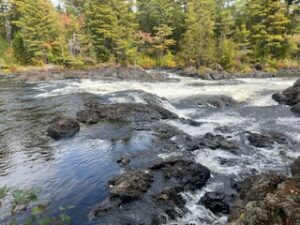Simon Winchester certainly knows how to make the most of uncomfortable predicaments. Whether it is a dicey week on Greenland’s icy mountains as a geology student at Oxford University, or a spell in an Argentine jail on espionage charges during the Falklands War, he turns the experience into a great account. That account is realized to its fullest in his new book, "Atlantic." One suspects it is the book that the writer of such best-sellers as "Krakatoa" and "The Professor and the Madman" has wanted to write all his life — or at least since he first crossed the eponymous stretch of water aboard an ocean liner when he was 18.
REVIEW
"ATLANTIC: GREAT SEA BATTLES, HEROIC DISCOVERIES, TITANIC STORMS, AND A VAST OCEAN OF A MILLION STORIES." By Simon Winchester. Harper. 495 pages. $27.99
That voyage is one of the personal experiences that bracket this marvelous exploration of an ocean in all its qualities. The other is a more recent pilgrimage to a seaman’s grave on the Skeleton Coast of Africa, a voyage he conceived of in Patagonia, on the other side of the South Atlantic. For Winchester, like his compatriot Patrick Leigh Fermor with whom he shares an erudite enjoyment of adventure, such incidents are the starting point for ruminations that travel quite literally all over the map.
Open "Atlantic" at random and a classic turn-of-phrase jumps off the page. He uses a wry understatement, often associated with the British. Viking expansion, he observes, for some time made the Atlantic "a zone of unpredictable and ceaseless unpleasantness." He also has an eye for the detail that brings a story to life: In the Greenland emergency, his minimal remaining supplies included "bizarrely, a single carton of bay leaves." Then there is his curiosity about everything. Even the book’s typeface gets a little story. It all goes to make the hefty tome a joy to read.
Tackling the biography of the Atlantic — the original title, "Atlantic: The Biography of an Ocean," was vetoed by Barnes & Noble as too boring — is a formidable undertaking. There are two parts to the tale, and they are inherently incongruous. The human story perches roughly in the middle of the geological one, a mere 200,000 years (to be generous) in what will end up just shy of a 400-million-year saga. Actually, serious human interaction with the Atlantic is a matter of only a couple of millennia, during which time it has changed — in our understanding — from an outer limit into a vast mysterious entity, and then into a bridge toward new opportunities.
To frame our short but frenetic relationship with the sea, Winchester uses the "Seven Ages of Man," the famous speech from "As You Like It." Like toddlers, we first stuck our toe in the Atlantic’s water, then successively learned to explore it, to love it and to fight over it. The last three ages are more general: our growing oceanic dependence required laws and organization. And inevitably, with human order established, we started to take the ocean for granted, then became content to let it decline from our carelessness. But ours is a short perspective. The eternal ocean merely readjusts itself, whether to our liking or not.
Actually, it isn’t eternal at all, thanks to the power of plate tectonics. Winchester uses the ocean’s geological back story to set the stage for the creation of the Atlantic and to describe its probable death. His description of the former has the verve of a "You Are There" broadcast: "A gigantic series of explosions started to cannonade around … Unbearably huge earthquakes began to shake and shatter the planet … The immense universal continent of Pangaia … started to weaken and groan with the weight and weariness of its long existence."
The end of the Atlantic will be less dramatic, though it’s certainly not going out with a whimper. The author employs a lovely conceit: the bumping together — "with the slowest and gentlest of collisions" 170 million years from now — of two lighthouses that are now 10,000 miles apart.
"Atlantic" is a font of information, from fascinating facts (never use the honorific "mon" when addressing a French naval captain by his rank. Napoleon took it away in disgust after his navy lost the battle of Trafalgar; it is plain "capitaine" to this day), to important developments (the Dutch city of Rotterdam’s innovative response to sea-level rise), to sweeping historical conclusions (pirates and slavers were the "inadvertent godfathers" of naval warfare and its strategy).
Winchester addresses all things Atlantic, including the many ways we are polluting it, about which he writes passionately.
And yet he is surprisingly circumspect — unduly so, in my opinion — on the subject of the human contribution to global climate change. But perhaps other readers will appreciate such restraint.
Simon Winchester’s life and interests have taken him all around and back and forth and back again across the Atlantic. He has also amassed more than a few years’ worth of formidable research about it.
Top all that off with his gifts as a raconteur, and you have a book that will please and fascinate anyone who has ever seen a ship or a wave.



